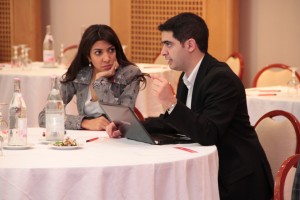
Between January 22-24, 2012, the World Association of Newspapers and News Publishers (WAN-IFRA) hosted the fifth annual Arab Free Press Forum at the Ramada Hotel in Gammarth, a suburb of Tunis. The conference addressed questions concerning the future of Arab media in the context of the broad wave of reforms the Middle East and North Africa (MENA) region is undergoing. More than 200 media professionals from all across MENA gathered – from Yemen to Morocco. Although the conference opened with a call for greater freedoms, the region’s current state of free expression was subject to debate among the participants.

Mohamed Mahfoudh, a Tunisian member of civil society who has previously worked with Amnesty International and National Democratic Institute (NDI), says that despite the overthrow of the former authoritarian regime, no greater gains have been made for Tunisian media. “In terms of journalistic freedom of expression, nothing has really changed. Today, different channels of communication have become the annexes of political parties – particularly those of the far left who did not win very many seats in the [Constituent Assembly] elections,” he said. Mahfoudh emphasized that the state of Tunisian media has deteriorated, becoming a “partisan politics playing field.”
An Iraqi independent blogger attending the forum, Qais Qazaz, shared similar thoughts in assessing the level of freedom of expression in his home country. “The situation changed dramatically after 2003 – on paper. We are technically able to express ourselves freely and we saw a blossoming of over 700 media organizations. However, it is still very dangerous to condemn the government.” Qazaz went on to say that several dissident media figures continue to be targeted and sometimes assassinated by individuals not associated with the government, but “condoned by it.”
Qazaz said that the Iraqi government has yet to come to fully understand the blogging phenomenon, giving them a huge advantage. “They cannot yet anticipate how bloggers operate due to a lack of familiarity with the field.” Social media interaction, on the other hand, is still heavily monitored. “Behind screens, there is no freedom,” he asserted. When asked what it will take to bring a prospect of real change to press freedom in Iraq, Qazaz unhesitatingly said, “Only a complete overhaul of governmental officials – from the president to every administrative figure.”
One Bahraini journalist and activist, Nazeeha Saeed, acknowledged the grave abuses the government is committing against journalists in Bahrain, but was much more optimistic. “We are all certainly facing challenges, especially during such a transitional phase for our region as a whole. This is why we are gathered at the conference – to exchange ideas and create a free future together.” Saeed did point out however, that in Bahrain, the safety of journalists is the number one priority. “In Bahrain, we are attempting to secure the safety of our media, who are routinely hounded by the government and tortured and killed in prisons.”
Magda Abu-Fadil, a long-time journalist and Director of the Journalism Training Program at the American University of Beirut, offered some wise words regarding the level of media freedom in MENA. “The region is still undergoing a transition and the dust hasn’t yet settled – so it’s inevitable to have quite a mixture of levels of press freedom – or the lack there of. You cannot make sweeping statements – the region isn’t monolithic,” she said.

Abu-Fadil mentioned that the last time she visited Tunisia, she was not able to even access her university email account. “The chokehold that the Ben Ali regime had on the internet and media in general was debilitating.” Regarding the degree of press freedom in Tunisia today, Abu-Fadil highlighted the progress that has been made while emphasizing that greater gains take time. “Relative to what existed during my last visit in 2004, there has definitely been a change and I hope it only continues evolving for the better. People have broken the fear barrier, and there is no going back now.”
Magda Abu-Fadil also reassured that despite the current challenges Tunisia is undergoing in regards to press freedom, the world should remain optimistic. “Things [in Tunisia] have not been sorted out completely – and this takes time! No revolution is overnight. It can’t be. It has to go through a process, and what Tunisia is undergoing is completely normal.”
Abu-Fadil and Saeed both remarked the significance of hosting the Arab Free Press Forum in Tunisia. “Tunisia has become the Arab world’s safe haven – it is my second time in only two months. Even though the Tunisian transition is nowhere near completion, we still have the ability to speak freely here. As a Bahraini, I consider this a treasure,” Saeed said.
All photos courtesy of Aymen Omrani.